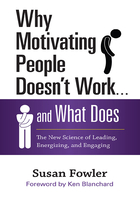
Ask the Right Question
Back to my opening question. Are you motivated to read this book? This is simply the wrong question. What if I asked instead, Why are you motivated to read this book? I might discover that the reason you are reading the book is because you take being a leader seriously and you are struggling with the motivation of a member of your staff. You are hoping this book might shed light on your motivation dilemma. Or I might discover that you are reading this book because the head of your department told you to read it and you're afraid of what might happen if you don't. These are two very different reasons for being motivated that generate different qualities of energy. Instead of asking if you are motivated, I need to ask a different question to reveal your reasons for acting.
An important truth emerges when we explore the nature of motivation. People are always motivated. The question is not if, but why they are motivated.
The motivation—or energy and impetus—a person brings to any action can be qualitatively different. Some reasons people are motivated tend to promote well-being for themselves and others—and unfortunately, some reasons don't.
• Motivation that comes from choosing to do something is different from motivation that comes from having to do it.
• Motivation generated from values, purpose, love, joy, or compassion is different from motivation generated from ego, power, status, or a desire for external rewards.
• Motivation to compete because of a desire to excel (where the score serves as feedback on how successfully you are growing, learning, and executing) is different from competing for the sake of besting someone else, to impress, or to gain favors.
One of the primary reasons motivating people doesn't work is our naïve assumption that motivation is something a person has or doesn't have. This leads to the erroneous conclusion that the more motivation a person has, the more likely she will achieve her goals and be successful. When it comes to motivation, assuming that more is better, is too simplistic and even unwise. As with friends, it isn't how many friends you have; it is the quality and types of friendships that matter.
Imagine you are a sales manager. You wonder if your sales reps are motivated. You look at the midquarter sales reports for your two highest-selling reps and conclude, yes, they are both highly motivated. What you might fail to notice is that they are motivated differently. The reason one rep works hard is to win the sales contest, to be seen as number one, and to make the promised bonus. The reason the other rep works hard is because he values your products and services, his efforts are connected to a noble purpose, and he enjoys problem solving with his clients. The science of motivation provides compelling evidence that the reps' different types of motivation have major implications. The quality of their energy affects short-term results and long-term stamina.
Traditional motivation prompts the questions, Is this person motivated? How much motivation does this person have? These questions reduce your answers to simplistic black-and-white, yes-or-no responses that fail to provide much-needed insight into the nature of the motivation. But asking why a person is motivated leads to a spectrum of motivational possibilities. Appreciating these possibilities, and the implications behind each of them, enables you to take advantage of the new science of motivation and guide your people to a more optimal and higher-quality motivational experience.